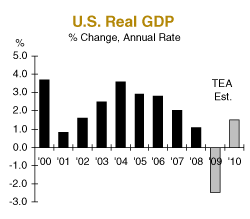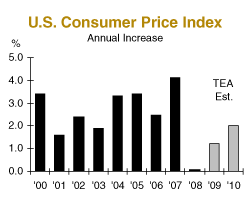|
March 18, 2009
Spring Cleaning
Written by Jeff Thredgold, CSP, President, Thredgold Economic Associates
The U.S. Economy
…long and deep
The struggling American economy, officially in recession since December 2007, hopes to establish a foundation for renewed growth before the end of the year. A combination of home price stabilization, a bit of optimism from the national media, and the impact of massive amounts of stimulus should help establish just such a foundation.
 The current U.S. recession, entering its 16th month as April begins, is widely expected to be the longest and deepest of any since the Great Depression. A renewal of modest (but positive) growth during 2009’s final quarter—the evolving consensus view of forecasting economists—would see the current recession approach 20-24 months in duration, nearly three times the length of the two prior recessions of the early 1990s and in 2001. The current U.S. recession, entering its 16th month as April begins, is widely expected to be the longest and deepest of any since the Great Depression. A renewal of modest (but positive) growth during 2009’s final quarter—the evolving consensus view of forecasting economists—would see the current recession approach 20-24 months in duration, nearly three times the length of the two prior recessions of the early 1990s and in 2001.
The Administration and the Federal Reserve continue to throw mud at the wall, seeing what sticks in terms of effective “stimulus.” As before, many of the programs being enacted have never been tried before.
Budget Deficits
…mind-boggling numbers
The phrase “being in uncharted waters” aptly applies to the level of deficit spending now underway. The new Administration’s spending initiatives will see a deficit likely exceeding $2 trillion ($2,000,000,000,000) in fiscal year 2009, which began October 1, 2008. To the President’s defense, he did inherit economic and financial chaos from his predecessor.
Note that much of the stimulus spending is geared to enhancements to the nation’s social safety net, with less toward economic stimulus. The $787 billion program clearly has a Democratic flavor to it.
Also note that much of the initial TARP program investment into financial institutions will, in my view, be returned to the taxpayer in coming years at a profit. Remember when the U.S. government bailed out Chrysler nearly three decades ago? The American taxpayer ultimately made money on that deal.
Unemployment
…higher and higher
The severe economic contraction that became widely felt during 2008’s final few months has ravaged U.S. employment. The U.S. economy suffered a net decline of 3.1 million jobs during 2008, the worst year since 1945. A similar number of job losses seems on tap this year.
The nation’s jobless rate now exceeds 8.0%, with additional increases in store. The jobless rate could easily approach 9.5% within the next 8-12 months, with more bearish forecasters seeing a 10.0% or higher rate.
 Inflation Inflation
…up or down?
Just as the escalation of oil and other commodity prices fueled the sharp rise in consumer inflation during 2007 and 2008’s first half, the plunge in those prices led inflation pressures much lower. When all was said and done, the Consumer Price Index rose 0.1% in 2008, the smallest rise in 54 years.
Note that widely divergent views are the norm regarding inflation during the next few years. One influential camp of economists sees major inflation pressures during 2010 and beyond resulting from massive budget deficits and highly aggressive monetary policy.
The other camp sees a Japanese-style deflation unfolding in coming years, tied to weak home and commodity prices and global recession. For now, we will take the middle road.
The Federal Reserve
…at historic lows
The Fed has been pulling out all the stops during the past 6-12 months, struggling to overturn financial paralysis that has engulfed financial markets. The Fed’s critical federal funds rate, at an all-time low of 0.00%-0.25% since mid-December 2008, could easily stay at that level the entire year.
Long-Term Interest Rates
…low and lower
Thirty-year fixed-rate mortgages for conventional loans have remained near 5.00% in recent weeks. Mortgage finance for higher-priced homes remains spotty in many communities.
Officials at both the Treasury and the Fed have indicated a desire to see mortgage rates approach 4.50% this year. Such lower rates would be perhaps the least costly way to see existing home prices stabilize and clear high levels of new and foreclosed homes from the market.
The Global Economy
…going nowhere quickly
Much of the developed world is now in recession, with similar challenges for emerging markets around the globe. For the first time since World War II, the U.S., Japan, and Europe are in recession simultaneously. Such global weakness will likely persist well into 2010.
China is dealing with major challenges tied to economic slowing. The never-ending migration of million of citizens annually from the farms to the factories has been disrupted as thousand of factories have closed due to sharply lower global demand for exported goods. Higher levels of social unrest could easily be experienced in China this year and next.
Japan has fallen back into recession, with the economy contracting at an alarming 12.0% annual rate during 2008’s final quarter. A plunge in exports to the world is the culprit. India has seen its growth rate cut nearly in half during the past year.
As noted frequently, European politicians and business leaders were laughing at the U.S. during mid-2008 for the enormous financial mess we found ourselves in. Europeans stopped laughing when the gravity of their own financial and economic stress became more apparent. Recession across Europe and the U.K. could last well into 2010.
Life was good in Russia when oil prices exceeded $100 per barrel, with millions of people enjoying rising living standards. The plunge in oil and various commodity prices has clearly thrown a wrench into Putin’s grand plans.
Many South American nations are now struggling with lower prices for their prized commodities, including oil. Many nations suffer from high levels of government inefficiency and rampant corruption.
Canada is in recession as its major export customer…the United States…buys less. Weakness in energy prices has also slowed growth in Western provinces, while Eastern Canada struggles with a very weak auto sector. Mexico is likely to enter recession this year. The serious escalation in drug trafficking violence threatens to damage the nation’s critical tourism sector.
The Bottom Line?
A serious U.S. recession will (hopefully) give way to stabilization and modest growth later this year or very early in 2010. We also expect…unprecedented budget deficits tied to massive “stimulus” spending…more employment pain…modest inflationary pressures this year…extremely low short- and long-term interest rates…and a sick global economy.
A final note? We Will Get Through This!
• Email this article to a friend
• Learn about econAmerica, Jeff’s latest book
|
|
Subscribe to the Tea Leaf
Like what you just read? Have Jeff Thredgold’s Tea Leaf emailed to you free each week. Subscribe today.
|
|
|

“Tea”ser
Change is inevitable except from a vending machine.

“Tea”stimonial
“Let’s face it: There just aren’t that many people who can make an hour of economics interesting, much less fun. You manage to do both time and time again for our audiences. During the eight programs on which we have collaborated, you have been nothing less than professional, insightful, informative, and amusing.”
• More testimonials
Invite Jeff Thredgold to speak at your next conference, meeting, or client function
If you like the Tea Leaf, you’ll love Jeff Thredgold’s live presentations. Jeff takes your audience on a timely, engaging, and entertaining tour of the U.S. economy and financial markets. Debunking some of today’s most common economic myths, he offers a clear picture of how the American economy is really performing and what that means for the future of your finances.
• Watch video clips of a Jeff Thredgold presentation.
• Download more information that you can e-mail to other decision makers.
• See Jeff Thredgold’s speaking calendar.
• Tell us about your event using our online form and we will contact you. Or, is there an individual in your organization you would like us to contact?
• Give us a call at 1-888-THREDGOLD (847-3346) to ask about Jeff’s availability and pricing for your event, or for any other information.
|

